Government Distributes Land to Yukpa Indians | Nunca es tarde cuando la tierra llega
By Humberto Márquez
IPS
English | Spanish
Caracas – The Venezuelan government’s decision to expropriate 25 ranches to distribute 15,800 hectares of land to communities of Yukpa Indians in the northwest of the country partially makes up a long-standing debt to the native group.

Main First Nations of Venezuela. Circled names represent Arawak ethnicities. Underline names are the Carib groups.
However, it leaves open several questions, such as whether national and international projects being carried out under the Initiative for the Integration of Regional Infrastructure in South America (IIRSA), which is paid to expand the exploitation of coal and other minerals, an activity that is already ongoing in the north of the Yukpa area as in the Colombian side of the border, will be indefinitely cancelled.
“It is interesting that the lands in the eastern areas of the territory claimed by the Yukpa were delimited, separating them from the Sierra de Perijá, farther west, which also used to be their territory,”
Juan Romero, an opposition legislator from the northwestern state of Zulia, told IPS.
One explanation, according to Romero,
“could be that the State would keep for itself a strip for the eventual exploitation of those resources”
in the Sierra de Perijá, a mountain chain that runs north-south along the Colombian border.
The majority of the Yukpa, who number nearly 10,000, live in Venezuela. But some communities are still located in the mountains across the border in Colombia.
The 1999 constitution, adopted after President Hugo Chávez took office, required the demarcation of indigenous territories. In the case of the Yukpa, whose land was systematically stolen from them over the past century, some communities started to come down from the mountains in the last few decades to occupy idle land on cattle ranches that they claim as their ancestral territory.
They were demanding a territory of 285,000 hectares located between the Sierra de Perijá and the fertile plains from which they were gradually driven in the 20th century by the expansion of cattle ranching and oil prospecting.
But the land they are claiming to the west of the oil-rich Lake Maracaibo is the leading milk and beef producing region in the country, where hundreds of large ranches operate. It is also rich in coal.
As they moved down to the plains in the last few decades, communities of Yukpa, and of Barí Indians farther to the south, have clashed with local ranchers, with some Wayúu Indians – from the Guajira peninsula, to the north – who work as sharecroppers or rent land, and even among themselves.
Three indigenous people were killed in an incident between Yukpa communities in October 2009, after the Chávez administration handed over communal land titles to 41,600 hectares to three of the more than 100 Yukpa communities.
With regard to the coal deposits on the land claimed by the Yukpa, anthropologist Lusbi Portillo with Homo et Natura, an environmental group that has supported indigenous people in their struggles for land over the last quarter century, told IPS
“that coal will not be exploited, at least without the consent of the Yukpa, because a large part of it is under the ranches that the government decided to hand over to their communities.”
To the north of the Sierra de Perijá, in the foothills of the Montes de Oca, the Cerrejón mine in Colombia has 900 million tons in proven coal reserves and produces 32 million tons annually, while the Guasare mine in Venezuela has 400 million tons in reserves and produces 6.8 million tons a year.
“Without a doubt much more land must be expropriated to complete the territory claimed by the Yukpa, and there is still a long way to go for indigenous people to fully achieve rights like free determination, autonomy or self-government, jurisdiction of native laws, and the use of natural resources within their territories,” Portillo said.
“But President Chávez’s decision, announced by Vice President Elías Jaua, makes us very happy, and we give him credit for that. It is never too late for good news,” the activist said.
At the ceremony to inaugurate one of the new indigenous farms on Oct. 12, Jaua asked the Yukpa
“to help us salvage traditional values like collective work, solidarity and fraternity, to build an Amerindian socialism”.
The vice president said that
“the people who worked and invested resources in the 25 farms that the government recovered for the Yukpa will be compensated and will be given help to find new land, to continue their productive activities.”
“We have proposed a peaceful agreement to take these lands and pay everything that is necessary so that the Yukpa can occupy the premises,” he said.
For years, the government had refused to pay for the improvements made by ranchers and farmers on the land, as the Barí and Yukpa communities were demanding in order to put an end to their long-running disputes with local farmers.
Some ranchers have said they will gladly hand over the land in dispute as soon as the government pays for the improvements they have made on it. But in the meantime, they say, they will stay on the land, and keep it guarded.
“It is just that the government has a bad reputation for paying up. That is why the ranchers are prepared to keep working on their farms until the government lives up to its promises,”
said the president of the national cattle ranchers association, Cipriano Heredia.
Miguel Rincón, of the ranchers association of Machiques – the main city in the area – said
“the 25 affected farms, 10 of which are already occupied by the Yukpa and 15 that are to be handed over, now have 20,000 head of cattle and represent a production of 2,000 steers a year and 25,000 litres of milk per day.
“That production is at risk of being lost in this country that imports meat and milk, because the experience on the ranches that have been occupied by indigenous people indicates that they consume what they find, sell to the best buyer, and even sell pieces of land to Wayúu Indians and local peasants, before abandoning the place,” Rincón remarked.
Legislator Romero also warned that the government ordered the expropriation of the ranches to go ahead without waiting for the native territories demarcation commission, an environment ministry body, to finish its work.
Furthermore, he said that the studies on social and productive aspects required by law to ensure the economic viability of the new collectively-owned indigenous farms had not been presented.
But Reina Ubiriche, chief of the El Tokuko Yukpa community in the foothills of the Sierra de Perijá, said they had recovered
“what was stolen from us…
We will work the land and the fruits it produces will be our thanks.”
Source: IPS
Por Humberto Márquez
IPS
inglés | español
CARACAS – La decisión gubernamental de expropiar 25 haciendas para entregar 15.800 hectáreas de tierras en propiedad colectiva a comunidades yukpa del noroeste de Venezuela repara parcialmente una vieja deuda con esa etnia caribe, aunque deja abiertas interrogantes sobre su desarrollo y el de la región.
Una pregunta es si definitivamente se cancelarán los proyectos, estatales y de trasnacionales, enmarcados en la Iniciativa para la Integración de la Infraestructura Regional Sudamericana (IIRSA), para ampliar la explotación de carbón y otros minerales que ya se realiza tanto al norte de la zona yukpa como del lado colombiano de la frontera.
“Llama la atención que fueron delimitados terrenos en las zonas más orientales del territorio reivindicado por los yukpa, distanciadas de la Sierra de Perijá, más al occidente, que también han sido su hábitat”,
observó a IPS Juan Romero, diputado opositor por el noroccidental estado de Zulia.
Una explicación, según Romero,
“podría estar en que el Estado se reservaría una franja para una eventual explotación de esos recursos”
en la Sierra de Perijá, una cadena montañosa que en dirección sur-norte marca parte de la frontera con Colombia.
La mayoría de los yukpa, alrededor de 10.000, viven en Venezuela, pero algunas comunidades persisten en la zona colombiana de la Sierra, a donde se replegaron tras el avance de explotaciones agropecuarias y minerales a lo largo del siglo XX en las zonas llanas de uno y otro lado de la frontera.
En el caso de Venezuela, esas zonas llanas son las ubicadas al occidente del petrolífero lago de Maracaibo, con centenares de establecimientos que son la primera región productora de leche y carne vacuna en este país.
La mayoría de los ganaderos llegaron al lugar tras las primeras prospecciones petroleras, a comienzos del siglo XX, y sus posesiones avanzaron en detrimento de territorios que reivindican como de sus ancestros los indígenas yukpa, sus parientes japreria (un puñado de familias) y los barí, más al sur, un pueblo de raíz chibcha.
En las últimas décadas, comunidades yukpa –también barí– han avanzado sobre haciendas o se situaron a sus márgenes, generándose conflictos con los “watía” (criollos), con algunos indígenas wayúu (de la península de la Guajira, más al norte) instalados como aparceros, e incluso entre grupos de la misma etnia.
Tres indígenas murieron en un incidente entre yukpas en octubre de 2009, después de que el gobierno de Hugo Chávez reconoció a varias comunidades yukpa un lote de terreno de unas 40.000 hectáreas, pero mantuvo sin delimitar el resto del territorio reivindicado, más de 200.000 hectáreas, incluidas áreas con ricas vetas carboníferas.
“Ese carbón no van a explotarlo, al menos no sin el consentimiento de los yukpa, porque buena parte está bajo las haciendas que el gobierno ha decidido entregar a sus comunidades”,
declaró a IPS el antropólogo Lusbi Postillo, de la organización Homo et Natura, que acompaña las luchas indigenistas desde hace un cuarto de siglo.
Al norte de Perijá, en las estribaciones de los Montes de Oca, la mina colombiana de Cerrejón contiene reservas carboníferas probadas de 900 millones de toneladas y produce 32 millones de toneladas anuales, en tanto la venezolana de Guasare tiene unos 400 millones de toneladas en reservas y produce 6,8 millones de unidades al año.
“Sin duda faltan muchas más tierras para completar la totalidad del territorio yukpa señalado y autodemarcado, así como otras conquistas vinculadas, como el derecho a la libre determinación, a la autonomía o autogobierno, a la jurisdicción indígena, y al uso de los recursos naturales dentro de su territorio”, dijo Portillo.
“Pero la decisión del presidente Chávez, anunciada por su vicepresidente Elías Jaua, nos produce una alegría infinita, y se lo reconocemos. Nunca es tarde cuando la dicha llega”, postuló el antropólogo.
Jaua pidió a los indígenas yukpa, al cortar simbólicamente los alambrados de una de las fincas el 12 de este mes, que
“nos ayuden a salirnos de las desviaciones y a rescatar los valores originarios como el trabajo común, la solidaridad y la hermandad, a construir un socialismo indoamericano”.
El vicepresidente aseguró que
“las personas que trabajaban e invirtieron recursos en los 25 predios que recuperó el gobierno para la etnia yukpa serán indemnizadas y se les ayudará a conseguir otras tierras para que continúen con su actividad productiva”.
“Hemos propuesto un arreglo pacífico para la toma de estas tierras y todo lo que haya que pagar para que los yukpa puedan ocupar los predios será cancelado”, aseguró Jaua.
Durante años, el gobierno había rechazado la tesis de pagar las “bienhechurías” (mejoras realizadas por los ganaderos y agricultores sobre sus predios) como reclamaban barí y yukpa para zanjar sus largas contiendas con los ocupantes criollos.
Varios ganaderos afectados han dicho que aceptarán de buen grado la devolución de sus tierras siempre y cuando el gobierno les pague las bienhechurías y que, entretanto, prevén permanecer en las haciendas bajo la vigilancia militar que se les ha impuesto.
“Es que la reputación del gobierno como pagador es muy mala. Por eso los ganaderos están dispuestos a permanecer trabajando en sus fincas hasta que el gobierno se ponga a derecho”,
dijo el presidente de la Federación de Ganaderos, Cipriano Heredia.
Miguel Rincón, del gremio Ganaderos de Machiques (principal ciudad de la zona), advirtió que
“las 25 fincas afectadas, 10 ya ocupadas por los yukpa y otras 15 que se les entregarán, con unas 20.000 cabezas de ganado, representan una producción de 2.000 novillos al año y 25.000 litros de leche al día”.
“Esa producción está en riesgo de perderse, en este país importador neto de carne y leche, porque la experiencia en las haciendas ocupadas por los indígenas es que consumen lo que encuentran, lo comercian al mejor postor e incluso venden parcelas de tierra a wayúu y campesinos criollos, y luego abandonan el lugar”, señaló Rincón.
También Romero advirtió que el gobierno ordenó tomar los establecimientos rurales sin esperar el trabajo de una Comisión de Demarcación de territorios indígenas que depende del Ministerio del Ambiente, y sin presentar estudios socio-productivos previstos por la legislación para asegurar la viabilidad económica de los nuevos predios indígenas.
En cambio, la líder Reina Ubiriche, cacica de la comunidad yukpa El Tokuko, en las estribaciones de la Sierra, aseguró que habían recuperado
“lo que nos fue arrebatado”.
“Trabajaremos la tierra y el fruto de ella será nuestro agradecimiento”, puntualizó.
Fuente: IPS

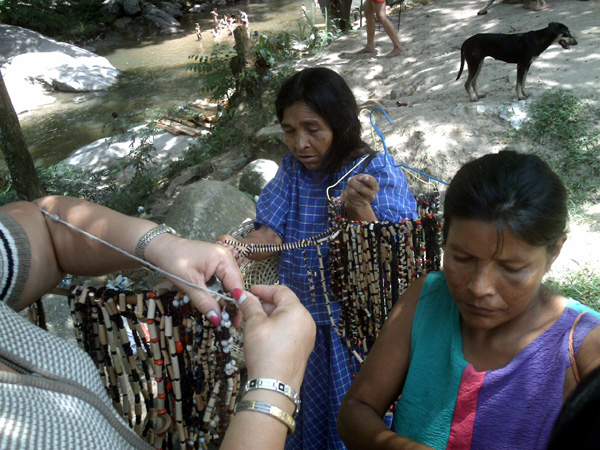
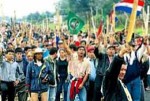
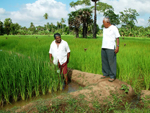
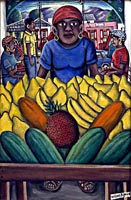


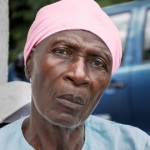
Comments
Government Distributes Land to Yukpa Indians | Nunca es tarde cuando la tierra llega — No Comments